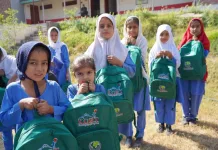
Lack of enforced regulation putting children at risk
A leading medic in Pakistan is warning that the news of 10 children from the South Asian nation, who tested positive for HIV this week after receiving blood transfusions, could be ‘just the top of the iceberg’ with many more likely to have contracted the disease.
After the news was revealed on Thursday, Pakistan’s already fragile and notoriously underfunded health system was once again brought into the spotlight for further questioning.
The children were receiving regular transfusions for the blood disease thalassaemia, according to secretary general of the Thalassaemia Federation of Pakistan, Yasmin Rashid.
The consortium of charities currently offers transfusions to 22,000 children and it is believed that more than just 10 of these are likely to now be HIV positive.
In Pakistan, laws exist which require blood to be screened for diseases, but due to poor enforcements, it is possible for infected batches to be approved, according to Javed Akram, vice chancellor of the Pakistan Institute of Medical Sciences.
“Most of the professional blood donors are drug abusers,” he said. “I think these cases are probably the tip of the iceberg. It is a scandal.”
Many children would require transfusions on a biweekly basis, he said, increasing their exposure to infected blood.
He added that he was aware of 16 children receiving transfusions who had tested positive for HIV so far.
Rashid said her organisation was told that at least 10 children had tested positive for HIV last week yet did not know how many children had been tested so far.
“These children are desperate for blood, they go to multiple centres,” said Rashid.
Most blood banks in Pakistan are privately operated and the quality, age and price of blood varies widely.















